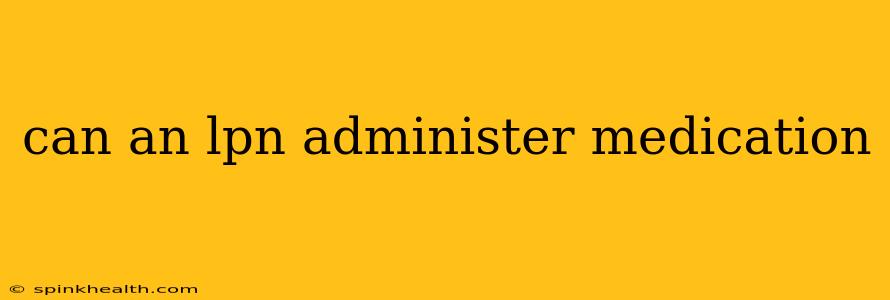Can an LPN Administer Medication? The Complex Answer
The question of whether an LPN (Licensed Practical Nurse) can administer medication isn't a simple yes or no. It's a nuanced answer that depends heavily on several factors, making it a question that's frequently asked and often misunderstood. Think of it like this: it's not just about the LPN, but also the location, the medication, and the specific state regulations.
Let's unravel this complex question, starting with the basics and then diving into the specifics.
What are the core responsibilities of an LPN?
LPNs, also known as Licensed Vocational Nurses (LVNs) in some states, are vital members of the healthcare team. Their role centers around providing basic nursing care under the supervision of physicians, registered nurses (RNs), or other licensed healthcare professionals. This can involve taking vital signs, assisting patients with activities of daily living (ADLs), monitoring patients' conditions, and documenting observations. But medication administration is a key component of their duties, though with important limitations.
So, can they administer any medication?
No. While medication administration is a significant part of an LPN's role, the type and method of medication administration are strictly regulated and vary by state. They usually cannot administer medications independently without the direct or indirect supervision of a physician or RN. This supervision can range from direct, hands-on observation to indirect oversight, where the RN is readily available if needed and has reviewed the medication administration plan.
What types of medications can LPNs typically administer?
The specific medications an LPN can administer depend on their training, state regulations, and the healthcare setting. Generally, LPNs are trained and authorized to administer:
- Oral medications: Pills, capsules, liquids.
- Topical medications: Creams, ointments, lotions applied to the skin.
- Injections: In some states and settings, LPNs may be allowed to administer subcutaneous (under the skin) or intramuscular (into the muscle) injections, but intravenous (IV) medications are typically administered by RNs.
However, even within these categories, there are exceptions. Some medications might require a higher level of nursing expertise or be restricted to RNs.
How do state regulations impact medication administration by LPNs?
Each state has its own Nurse Practice Act, which outlines the scope of practice for LPNs (and RNs). These acts define the specific tasks and medications LPNs are legally permitted to administer. This means that what an LPN can do in one state may be different in another. There's no universal rule; it's crucial to understand the specific regulations of the state where the LPN practices.
What about specific medication types like controlled substances?
The administration of controlled substances (narcotics, etc.) is tightly regulated and often requires additional training and certification. LPNs may be authorized to administer controlled substances under specific circumstances and with heightened supervision and documentation requirements.
What training do LPNs receive on medication administration?
LPN education includes extensive training on medication administration, encompassing pharmacology, dosage calculations, safe medication practices, and the recognition of potential adverse reactions. Continuing education courses also frequently cover updates in medication administration and best practices.
In summary:
The ability of an LPN to administer medication is not a straightforward yes or no. It depends on a complex interplay of factors, including the specific state's Nurse Practice Act, the healthcare setting, the type of medication, and the level of supervision available. It's always essential to consult the relevant state regulations and the policies of the healthcare facility to determine the exact scope of an LPN's medication administration responsibilities.

